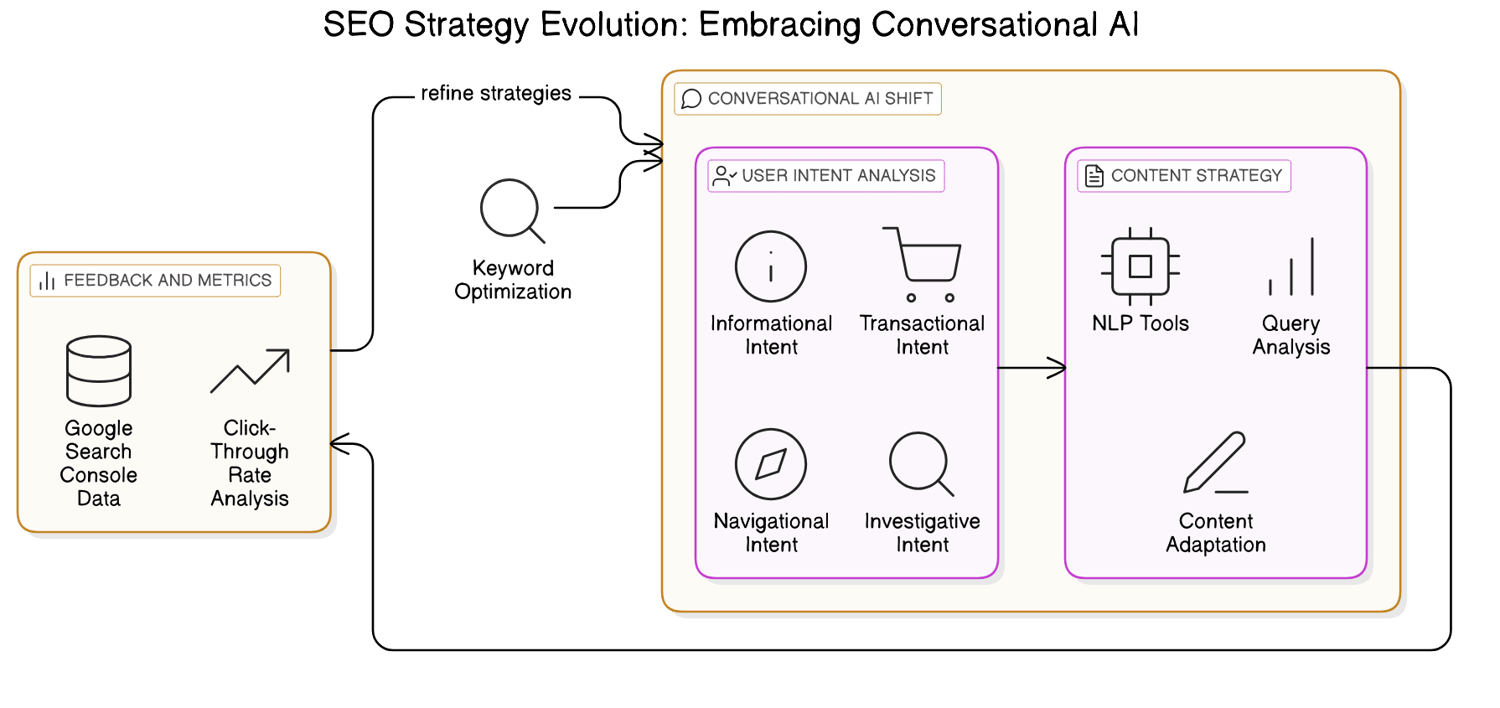Summary
This article dives into the transformative landscape of Google SEO in the age of AI, highlighting how these changes can significantly enhance your optimisation strategies. It’s an essential read for anyone looking to stay ahead in the rapidly evolving world of search engine optimisation. Key Points:
- Understand the evolving role of AI in semantic search, focusing on user intent and contextual meaning to create content that truly resonates.
- Adopt a multimodal approach to SEO by optimising across various media formats, utilising schema markup for rich snippets and enhancing discoverability through visual search techniques.
- Navigate ethical considerations and data privacy in AI-driven SEO strategies, ensuring transparency while leveraging advanced data analytics.
Is Your Google SEO Strategy Ready for the AI Revolution?
A Beginner`s Tale: My First Foray into AI-Powered Google SEO Plans and Early Setbacks
“Seriously? What’s happening?” I muttered over my cold coffee, frustration bubbling up. After hours of digging through data that only deepened my confusion, a colleague casually remarked during lunch, “Maybe you’re not hitting the right content angle?” That stung a bit; it was clear I'd fixated on keyword stuffing instead of understanding what users really wanted.
Honestly, I didn’t expect this to be so tough—my anticipation plummeted into disappointment in just five days. The stark contrast between expectation and outcome left me speechless; it was a real wake-up call in the world of SEO.
| SEO Technique | Description | Advantages | Latest Trends |
|---|---|---|---|
| Automated Keyword Research | Utilises AI to discover high-volume and relevant keywords. | Saves time and uncovers long-tail opportunities. | Integration with voice search optimisation. |
| Content Creation Automation | Generates SEO-optimised content based on keyword analysis. | Increases content output while maintaining quality. | Focus on user intent and engagement metrics. |
| Technical SEO Optimisation | Ensures website structure is crawled effectively by AI-driven search engines. | Enhances site speed, mobile responsiveness, and crawling efficiency. | Emphasis on Core Web Vitals as ranking factors. |
| AI Data Analysis Tools | Analyses large data sets for actionable insights in SEO strategies. | Facilitates informed decision-making for content and marketing strategies. | Real-time analytics integration for agile adjustments. |
| On-Page Optimisation Techniques | Improves individual web page SEO through targeted analysis of elements like titles and meta descriptions. | Boosts page relevance and CTR (Click-Through Rate). | `E-A-T` (Expertise, Authoritativeness, Trustworthiness) becoming crucial. |
The Turning Point: Overcoming Initial Challenges with AI in Google SEO Optimisation
"I thought you had this figured out," one colleague mumbled under her breath, not quite meeting my eyes. It stung. We all felt it—the weight of unfulfilled expectations pressing down on us like a thick fog.
"Maybe we’re missing something fundamental," another chimed in hesitantly. But what? The more we discussed our strategies over lukewarm coffee and stale doughnuts, the more fragmented our thoughts became. It was clear—this wasn’t just my struggle anymore; uncertainty was creeping into everyone’s mindset.
After five days of hopeful planning turned futile effort, I realised: understanding user intent wasn’t just a box to tick off; it was essential to our success—or else we'd be trapped in this cycle of frustration together. And then... there was silence again.
How We Helped Businesses Leverage AI for Enhanced Google SEO Plans
With mixed emotions swirling around the table, some believed we were on the right track while others remained sceptical. "This might be too ambitious; what if it doesn't work?" one voiced concern, prompting nods from several colleagues.
Despite our discussions and attempts to pivot strategies based on data insights, progress felt agonisingly slow. As we dissected analytics reports showing minimal increases—barely 5% over two weeks—an air of uncertainty lingered. It was clear: we needed to find clarity amidst this confusion before moving forward, yet no one could confidently say where that clarity lay.

 Free Images
Free ImagesFrequently Asked Questions: Demystifying AI in Google SEO Plans
Another common question is about automation — how does AI streamline keyword analysis? Well, imagine spending hours manually researching keywords; AI tools can do this for you instantly, saving time and ensuring you're targeting the right terms that resonate with your audience.
You may also be curious about user experience metrics like page load speed. I remember when I neglected mobile optimisation on my own site; it led to a noticeable drop in traffic! In today’s world, where users expect instant gratification, ensuring fast loading times is crucial for retaining visitors.
Lastly, predictive analytics can feel a bit daunting at first glance. However, once you get the hang of analysing historical data trends, you'll find it invaluable for forecasting future behaviours and adapting accordingly.
In summary, mastering these AI-driven techniques not only elevates your SEO game but also helps you stay competitive in an ever-evolving digital landscape. So don’t be afraid to embrace these innovations! 🌟
Beyond Keywords: How AI Impacts the Broader Google SEO Strategy?
The AI vs. Human Debate: Are We Over-Reliant on Algorithmic Google SEO Plans?
Practical Implementation: Integrating AI into Your Google SEO Plan Today
In the ever-evolving landscape of digital marketing, integrating artificial intelligence (AI) into your SEO strategy is no longer just an option; it’s essential. By leveraging advanced algorithms and machine learning, you can enhance content relevance and user experience significantly. I’ve seen firsthand how these methods can transform a website's visibility in search results, making them an invaluable addition to any SEO plan.
Many people underestimate the power of using AI tools effectively. For instance, when I first started experimenting with natural language processing (NLP), I was amazed at how accurately it could analyse search intent. This understanding allows for more tailored keyword integration that resonates with users' needs.
Here's a step-by-step guide to help you implement AI in your Google SEO strategy:
#### Step 1: Understand Search Intent Using NLP
Start by researching what your target audience is searching for. Tools like Google's BERT can help you grasp the context behind queries. Use this knowledge to refine your keywords and align them with user intent.
*Tools Needed:* Google Keyword Planner or SEMrush.
*Tip:* Create a spreadsheet to track keywords and their corresponding search intents.
#### Step 2: Utilise Machine Learning for Trend Analysis
Next, leverage machine learning models to predict trending topics within your niche by analysing vast datasets from user interactions across various platforms. This proactive approach will keep your content relevant.
*Tools Needed:* BuzzSumo or Ahrefs.
*Note:* Regularly check these tools so you stay ahead of emerging trends!
#### Step 3: Prioritise Structured Data Markup
Implement schema markup on your web pages to improve visibility in search results. Structured data helps search engines understand your content better, which can lead to higher rankings and rich snippets.
*Resources:* Schema.org offers comprehensive guidelines for different types of structured data.
*(Personal Tip: I love using Google's Structured Data Testing Tool after implementing markup—it ensures everything is set up correctly!)*
#### Step 4: Automate Content Generation Wisely
Consider using AI-driven content generation tools that maintain quality while streamlining production processes. However, always review generated content before publishing—human touch is irreplaceable!
*Recommended Tools:* Jasper.ai or Writesonic.
*(Just a reminder: While automation saves time, don’t forget about originality.)*
#### Step 5: Adjust Content Parameters
Finally, fine-tune key parameters such as content length, readability scores, and engagement metrics based on evolving Google algorithms. Regularly monitor performance analytics to ensure alignment with best practices.
*Key Metrics To Track:* Bounce rates and average session durations via Google Analytics.
*(I usually set weekly reminders to review these metrics—it keeps me accountable!)*
### Advanced Tips:
If you're keen on taking this further, consider exploring voice search optimisation techniques as they become increasingly vital due to smart speakers gaining popularity. Also, if time permits, delve into A/B testing different headlines or meta descriptions powered by AI insights—this could yield significant improvements in click-through rates (CTR).
Remember, integrating AI into your SEO efforts isn’t just about keeping up; it’s about staying ahead of the curve! Embrace these strategies today for long-term success in enhancing both visibility and user engagement on your site.

What`s Next for AI in Google SEO? Predicting Future Trends and Challenges
Conclusion: Embracing AI for a Future-Proof Google SEO Strategy
Now is the time to take action—explore AI-driven solutions that resonate with your audience's preferences and behaviours. By focusing on semantic understanding rather than just keywords, you can create content that truly aligns with user intent. This proactive stance will not only enhance your visibility on Google but also establish stronger connections with your users.
The trend towards AI-powered optimisation shows no signs of slowing down. Therefore, reflect on how you can incorporate these advancements into your existing strategies today—your future success depends on it!
Reference Articles
The Ultimate Guide to AI-Powered SEO Essentials
AI-Powered SEO leverages machine learning and data analytics to optimize your website. From cutting-edge keyword research to automated content creation and ...
Source: MerchyntSEO in the Age of AI: Impact of AI on SEO
AI-powered tools can automate keyword research, analyze search intent, and optimize content more efficiently than traditional methods.
Source: WSI Digital MarketingThe Evolving Search Landscape: How AI is Changing SEO
AI-driven search engines are more adept at crawling and indexing websites, making technical SEO a critical component of any optimization strategy. This includes ...
Source: Xponent21AI Is Driving The Future Of SEO: How To Adapt
AI-driven tools automate SEO tasks by analyzing data, providing recommendations and helping execute actions aimed at improving a website's ...
Source: ForbesHow to Use AI for SEO (Effectively)
AI tools can improve your SEO strategy by helping you automate data analysis, pinpoint user behavior trends, and discern content optimization suggestions.
Source: SmartBug MediaHow to Use AI to Power Your SEO Content & Rank #1 on Google
Alli AI is an SEO optimization tool, with an especially strong focus on on-page optimization. It can analyze the SEO of your web pages, giving ...
Source: WebFX20 Best AI SEO Tools & How to Use AI in 2024 [New Data]
AI SEO is a search engine optimization strategy that uses artificial intelligence to optimize webpages (such as blog posts and landing pages) to ...
Source: HubSpot BlogAI SEO: How to be visible in Google AI Overviews, chatbots, LLMs
4 ways to win in AI-powered search · 1. Continue ranking well on Google's SERPs · 2. Target informational keywords · 3. Go for relevant queries and ...
Source: Search Engine Land


 ALL
ALL SEO Techniques
SEO Techniques
Related Discussions